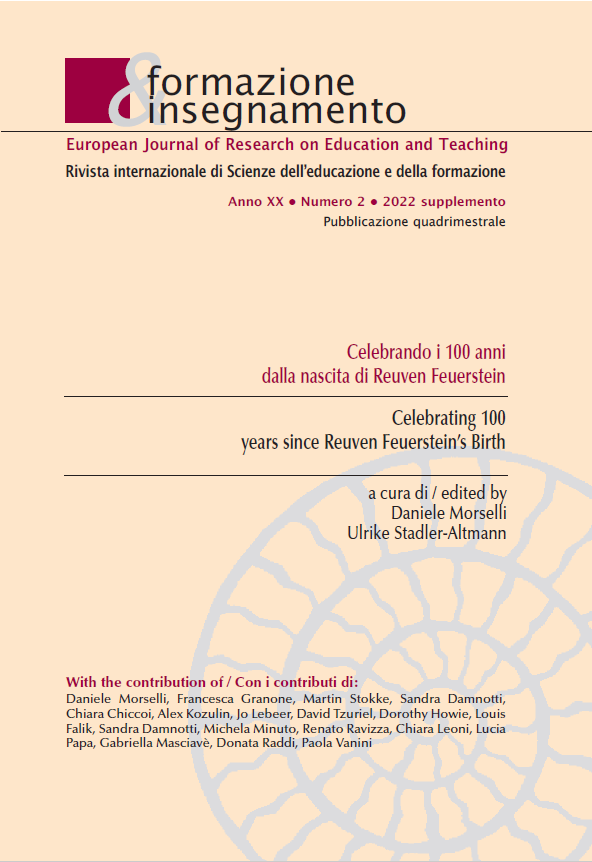Il contributo dell’esperienza di apprendimento mediato al processo terapeutico
DOI:
https://doi.org/10.7346/-feis-XX-02-22_06Parole chiave:
Esperienza di Apprendimento Mediato, Cognizione sociale, Funzioni cognitive, Micro-abilità, Processo terapeuticoAbstract
Il contributo propone l’applicazione della teoria dell’esperienza di apprendimento mediato (EAM) come fondamento del processo terapeutico. Per fare questo applica la teoria della modificabilità cognitiva strutturale (MCS) di Feuerstein a un modello integrato di cognizione sociale che connette l’EAM agli obiettivi attesi e di sviluppo dell’interazione terapeutica. Il contributo descrive innanzitutto il ruolo delle funzioni cognitive, poi collega i processi e i concetti al modello, incluse la natura delle risposte (sia in termini di contenuto che di processo), la qualità della risposta (sia implicita che esplicita), e il processo parallelo di sviluppo. Il paper termina mostrando come si può applicare l’EAM alle fasi di sviluppo della relazione terapeutica.
Riferimenti bibliografici
Beck, A. & Freeman, A. (1990). Cognitive therapy of personality disorders. New York: Guilford Press.
Egan, G. (1986). The skilled helper. 3rd Edition. Monterey, California: Brooks Cole.
Doidge, N. (2007). The brain that changes itself. New York: Viking.
Doidge, N. (2015). The brain’s way of healing. New York: Viking.
Falik, L. H. (2021). Integrating social cognition into therapeutic practice: beneath and beyond the process of therapy. New York: Routledge.
Falik, L. H. & Feuerstein, R. (1990). Structural cognitive modifiability: A new cognitive perspective for counseling and psychotherapy, International Journal of Cognitive Education and Mediated Learning, 1(2), 143-150.
Feuerstein, R., Rand, Y., & Hoffman, M. (1979). The dynamic assessment of retarded performers: The Learning Potential Assessment Device (LPAD). Baltimore, MD: University Park Press.
Feuerstein, R., Falik, L. H., & Feuerstein, R. S. (2014). Changing minds and brains: Reuven Feuerstein’s Legacy. New York: Teachers College Press.
Feuerstein, R., Feuerstein, R. S., Falik, L. H., & Rand, Y. (2006). Creating and enhancing cognitive modifiability: The Feuerstein Instrumental Enrichment Program. Jerusalem, Israel: ICELP Press.
Feuerstein, R., Rand, Y., Hoffman, M.B., & Miller, R. (1980). Instrumental enrichment: An intervention program for cognitive modifiability. Baltimore, MD: University Park Press.
Feuerstein, R., Feuerstein, R.S., & Shur, Y. (1997). Process as content in regular education and in particular in education of the low function retarded performer. In A. L. Costa and R. M. Liebmann (eds.). If process were content: the spirit of learning. Thousand Oaks, CA: Corwin Press.
Flavell, J. (1963). The developmental psychology of Jean Piaget. New York: D. Van Nostrand.
Goleman, D. (1995). Emotional intelligence: Why it can matter more than IQ. New York: Bantam Books.
Goleman, D. (2006). Social intelligence: Beyond IQ, beyond emotional intelligence. New York: Bantam Books.
Goleman, D. & Davidson, R. (2017). Altered traits: Science reveals how meditation changes your mind, brain, and body. New York: Avery.
Hackney, H. L. & Cormier, S. (2016). Counseling strategies and interventions for professional helpers, 9th Edition. New York: Pearson.
Kottler, J. (1993). On becoming a therapist. New York: John Wiley.
Kottler, J. A. & Carlson, J. (2014). On becoming a master therapist. New York: John Wiley.
Ivey, A.E. (1971). Micro-counseling: Innovations in interview training. Springfield, Illinois: Charles Thomas.
Schwartz, J. M. & Begley, S. (2002). The mind and the brain: Neuroplasticity and the power of mental force. New York: Regan Books/Harper Collins.
Siegel, D. (2007). The mindful brain. New York: W.W. Norton.
Teyber, E. (1996). Interpersonal process in psychotherapy. Monterey, California: Brooks Cole.
White, M. (1995). Re-authoring lives. Adelaide, South Australia: Dulwich Centre Publications.
White, M. & Epston, D. (1990). Narrative means to therapeutic ends. New York: Norton.
##submission.downloads##
Pubblicato
Come citare
Fascicolo
Sezione
Licenza
Copyright (c) 2022 Louis Falik

TQuesto lavoro è fornito con la licenza Creative Commons Attribuzione 4.0 Internazionale.
Formazione & insegnamento è distribuita con la seguente licenza: Attribution 4.0 International (CC BY 4.0).
Per ulteriori dettagli, si rimanda alle Politiche di archiviazione e ai Termini di Copyright e Licenza.





